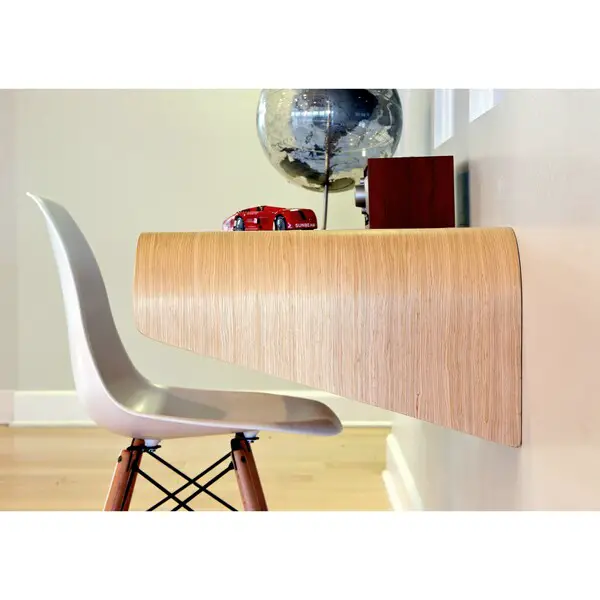Floating shelves are all the rage in homes and offices. But with you relying on them being installed correctly and with kids and hazards around the house, it should make you wonder are floating shelves safe? Let’s find out and debunk some myths along the way!
If you’re in a hurry, here is a site I recommended for furniture with lifetime guarantee!
Are Floating Shelves Safe?
Floating shelves are safe if they are installed and used properly. Floating shelves should be installed on a durable wall to the wall studs and with brackets for the most secure fitting. Even at that, floating shelves can become dangerous if they are overloaded. The weight limit of floating shelves tends to range between 44 – 280 pounds. This weight capacity should be sufficient for storage of appropriately sized items, office work or light activities. Abiding by the weight limit is essential to preventing the floating shelf from breaking under the weight. Floating office shelves also tend to have a small surface area. Therefore, items should be stored so that they are not liable to falling off the shelf. Floating shelves may not be suitable if children are able to reach them as they could pull them out and cause damage or injury.
Standing for long periods can cause tiredness despite good footwear. Source

Is it safe to use floating shelves in a child’s bedroom?
Floating shelves can pose a risk to children, especially younger children who are liable to pulling items off the shelves or pulling at the shelf itself. Some floating shelves are simply resting on wall projections, which means that they can be easily moved by a child. To make floating shelves safer, they can be secured at a height that the child cannot reach, even when climbing on objects. Furthermore, they can be secured in place with the likes of a bracket.
Tip: Wall mounted floating shelfs are excellent for using that unused recess in your room.
Can floating shelves fall?
Floating shelves can fall, become loose or lean to one side if not properly used or installed correctly. Floating shelves are more liable to falling if they are not secured in place with brackets.
Other factors which can lead to a floating shelf falling is if the floating shelves are not secured by means of wall studs.
Furthermore, if they are attached to a weak dry wall as opposed to a concrete wall,
Can floating shelves sag?
Floating shelves can sag if they are not properly supported on at least 2 wall studs. If your floating shelf is starting to sag, it may require an extra stud to properly support it.
It might also indicate that the floating shelf is not level. Alternatively, too much weight is probably being placed on the shelf.
Tip: You can save even more money by creating a DIY floating shelf with videos from YouTube.
Do floating shelves need studs?
Some manufacturers suggest that you can hang a floating shelf without studs. However, to achieve the most secure fitting possible, floating shelves should be attached to the wall using the studs.
If studs are not an option, you may need to consider additional supports such as wall anchors or toggle bolts to achieve the necessary support for your shelf.
Floating shelves are generally lower in weight and smaller in footprint than standard office desks.
Due to the lightweight nature of foldable desks, they can be less sturdy than standard solid desks. Furthermore, if they are poorly designed or installed, it can make them more liable to wobbling and even breaking if they are put under too much force.
Therefore, they may not be suited to environments and activities which require durability.
The material that the desk is made from will primarily dictate how durable the desk is.
If you do need a durable floating shelf, then the type of brackets that you use and the wall it is being attached to should be considered. These will also play a significant role in how well the floating shelf can withstand work.
Plus, if the floating shelf is not correctly installed, then they are liable to becoming damaged.
How much weight can a floating shelf hold?
Floating shelves tend to be able to hold about 50 pounds per stud. The average weight capacity of a floating shelf ranges between 44 – 280 pounds.
To put it in perspective, an average office desk which can hold approximately 100 – 800 pounds.
However, not everybody needs a shelf with a high weight limit.
If you can get a floating shelf with a higher weight capacity, then this is always the preferred option.
The average office desk carries around 15 pounds of equipment, between a laptop, monitor, keyboard and mouse.
If you add a bit extra weight for the force of your body typing or resting on the floating shelf, a 45-pound weight limit on a floating shelf will probably suffice if you wanted the shelf for office duties.
Therefore, if you’re only storing light objects or performing tasks which involve little force or light equipment, such as a laptop, then a floating shelf will probably suffice.
However, if you use heavy or bulky equipment that weighs more than 280 pounds, then they might not be suitable for your needs.
Tip: Opt for a floating shelf which offers about 20% more weight capacity than you need.
Conclusion
Floating office desks have their strengths and weaknesses. They tend to be less durable, especially if they are not correctly installed with the proper parts.
Furthermore, they have a lower average weight capacity than standard desks.
This may be restrictive if you intend to use it to store heavy or bulky items.
The type of floating desk that you opt for as well as the activities that you perform will ultimately dictate if they’re a safe choice for you or not!
Choosing a good quality floating desk with a weight capacity greater than 50 pounds will pay off in the long run for most people.
Here are some other useful articles I wrote that you should go check out:
- What Is A Floating Desk? – Surprising Facts & Useful FAQs!
- How Much Do Folding Desks Cost? + 20 Popular Examples!
- Folding Desk Weight – 20 Popular Examples + Helpful FAQs!
- Folding Desk Weight Capacity – 20 Popular Examples + FAQs!
- Folding Desk Size – 20 Best Desks + Simple Cheat Sheets!
Recommended items:
